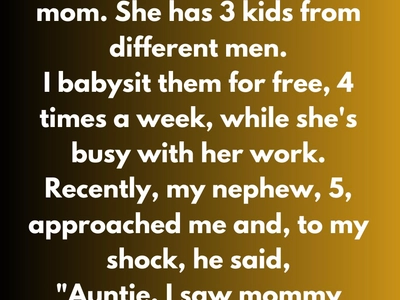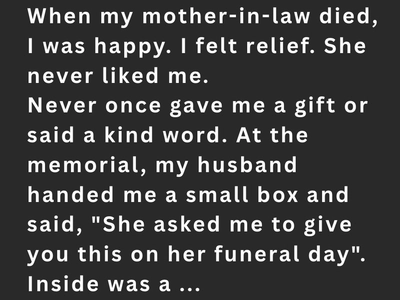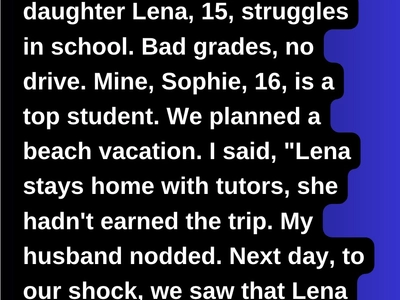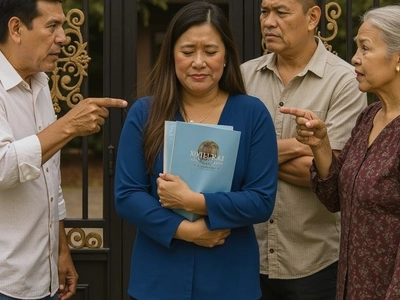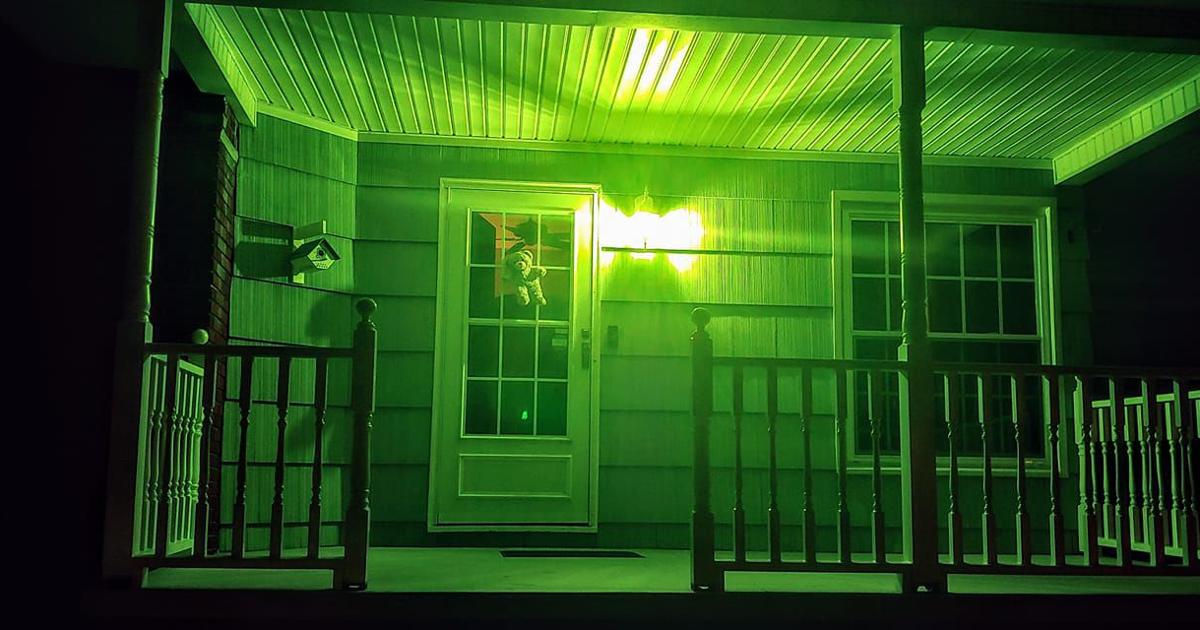My Nephew’s Innocent Words Uncovered a Family Secret I Never Expected
My sister is thirty-three years old, and her life has been anything but simple. She’s a single mom to three children who seem to burst with more energy than the sun itself. Each of them has their own personality, their own quirks, their own little ways of reminding me that the world can still be innocent and full of surprises. I’ve grown close to them over the years, closer than I ever imagined I could be, because I’m not just their aunt—I’ve become part of their daily rhythm, almost like a second parent in some ways.
My sister works long, demanding hours, trying to keep food on the table and some stability in their small apartment. It’s not easy for her, and it’s not easy for them either. That’s where I step in. Four times a week, sometimes more if things at her job get tough, I babysit the kids. I do it for free, and though people tell me I should charge or at least accept something for my time, I never even consider it. These kids are family. They are pieces of me, and being with them—even when they drive me to the edge of exhaustion—feels like something I’m supposed to do.
It can be exhausting, of course. By the time I finally drag myself home, my hair is messy, my clothes are stained with who knows what, and my voice is hoarse from reading story after story or refereeing their little arguments. But then I think about their faces when I walk in the door—their eyes lighting up, their arms reaching out, the squeals of “Auntie!” filling the room—and suddenly I know that every bit of energy I spent was worth it.
For the most part, that’s how life has gone: busy, tiring, messy, but also joyful. Then, not long ago, something happened that shook me in a way I hadn’t expected. It started small, almost too small to notice, but it grew into something that forced me to see my sister, my nephew, and even myself in a different light.
It happened one late afternoon. I was sitting on the couch, helping my seven-year-old niece with her math homework while the toddler banged plastic blocks together on the floor, creating his own noisy symphony. Out of the corner of my eye, I noticed my five-year-old nephew watching me with an intensity that didn’t match his usual playful mood. He had that look kids get when something is weighing on them, when they’re holding onto a secret they don’t quite know how to share.
He came closer, tugging gently at my sleeve. I turned to him, smiling, expecting maybe he wanted another cookie or for me to join him in some game. But his face was different. His big brown eyes, usually so mischievous, were clouded with worry. He leaned in close, lowering his voice to a whisper, as if he didn’t want anyone else to hear.
“Auntie,” he said softly, “I saw Mommy hiding your…” Then he stopped, his mouth snapping shut like he’d said too much.
My heart gave a sharp thud. Something about the way he looked at me, like he was scared of getting into trouble or betraying someone, made my chest tighten. I bent down so we were eye to eye, brushing the hair off his forehead.
“What do you mean, sweetheart?” I asked gently. “What did you see Mommy hiding?”
For a moment he bit his lip, his little hands twisting together. Then, in a voice so quiet I could barely hear, he said, “Mommy hid your necklace in her room.”
The words landed like a stone in my stomach. My necklace. The heirloom. The one piece of jewelry I cherished more than anything else. It had belonged to our grandmother, a woman who had been the steady anchor in our childhood when everything else felt like it was falling apart. That necklace was more than just metal and stone—it was memory, love, history. And for the last few days, I’d been tearing my house apart looking for it, convinced I must have misplaced it.
I stared at my nephew, trying to keep my expression calm, though inside my thoughts were racing. I didn’t want to accuse anyone, least of all my sister. She had her flaws, yes, but taking something that meant so much to me? That didn’t feel like her. Still, I couldn’t ignore what my nephew had said.
“Can you show me where, honey?” I asked softly.
He hesitated, then nodded. He slipped his small hand into mine and led me quietly down the hallway to my sister’s room. The kids thought of it as a forbidden zone—her space, her sanctuary—but he walked in without hesitation. He pointed toward the closet.
I opened the door, my heart pounding. Clothes hung in a cramped row, some neat, some crumpled, all smelling faintly of detergent and faintly of stress. I pushed a few aside and, sure enough, there it was. My necklace. Tucked behind a stack of shirts, hidden as if it wasn’t meant to be found anytime soon.
For a long moment I just stood there, staring. The sight of it filled me with such a storm of emotions that I couldn’t sort through them fast enough. Relief—it wasn’t lost. Anger—why was it here? Sadness—that my sister hadn’t told me. Confusion—what could she possibly have been thinking?
I closed the closet door gently, not wanting to make a scene in front of the kids. I thanked my nephew with a squeeze of his hand and told him it was our little secret for now. The last thing I wanted was for him to feel caught in the middle of something he didn’t understand.
That night, after the children had been tucked into bed, I sat my sister down at the kitchen table. The air between us felt heavy. I didn’t shout. I didn’t accuse. I just placed the necklace on the table between us and waited.
Her eyes went wide, then filled with tears almost instantly. She covered her face with her hands and shook her head. “I’m sorry,” she whispered, her voice breaking. “I’m so, so sorry.”
I swallowed hard. “Why?” I asked softly.
She pulled her hands away and the words tumbled out in a rush. She told me about the overdue bill, the fear of falling behind, the constant pressure of trying to hold everything together on her own. She admitted she had taken the necklace not to sell it, not to keep it from me forever, but because she didn’t know what else to do. She had thought maybe she could pawn it temporarily or use it as security for a loan, then buy it back before I even noticed it was gone. But things had spiraled, and she hadn’t figured out a way yet. She had been too ashamed to ask me directly for help.
As she spoke, the anger I’d expected to feel never really came. Instead, it melted away, replaced by a heavy sadness. Not because she had touched something so precious to me, but because she had felt she couldn’t trust me enough to come to me first. The thought that my own sister, the person I’d shared a lifetime with, felt she had to sneak around rather than ask for support—it broke my heart.
We talked for hours that night, long after the hum of the refrigerator was the only sound left in the kitchen. She told me about the stress of late fees, the embarrassment of collection calls, the loneliness of carrying a burden she couldn’t share. I told her about my love for her, about how I would always rather she come to me than risk losing the bond we’d fought to keep through so many ups and downs.
Together, we came up with a plan. It wasn’t magic—it wouldn’t solve all her financial troubles overnight. But it was a start. We looked at her budget, figured out where things could be adjusted, and talked about what help I could give without jeopardizing my own stability. It wasn’t just about money, though. It was about rebuilding trust, about reminding her she didn’t have to go through life alone, about showing her that family was more than just sharing blood—it was about sharing burdens too.
By the time we finally stood up from the table, both of us were emotionally drained but strangely lighter. I hugged her tightly, feeling her shoulders shake against mine, and whispered, “Please, just ask next time. That’s all I want.”
Later, when I went to check on the kids one last time before leaving, I found my nephew curled up under his blanket, his little chest rising and falling with the deep breaths of sleep. I leaned down and kissed his forehead, feeling a rush of gratitude for his honesty, for the courage it must have taken for him to speak up, even though he didn’t fully understand the weight of what he was saying.
That night, as I walked home, the air cool against my face, I kept thinking about how fragile trust can be, how easily it can crack and how important it is to mend it before it shatters. Families aren’t perfect. They stumble, they hurt each other, they make mistakes. But they also forgive, they learn, they grow.
And in that moment, I realized something. The necklace, as precious as it was, had always been a symbol of love passed down through generations. But maybe its real value wasn’t in the metal or the stone at all. Maybe it was in what it had just done—bringing my sister and me to a place of honesty we might never have reached otherwise, reminding us both that love means facing even the hardest truths together.
When I hugged my nephew a little tighter the next time I saw him, it wasn’t just out of gratitude. It was a promise to him, to my sister, and to myself—that no matter what storms came our way, we would face them not with secrets, but with trust.
